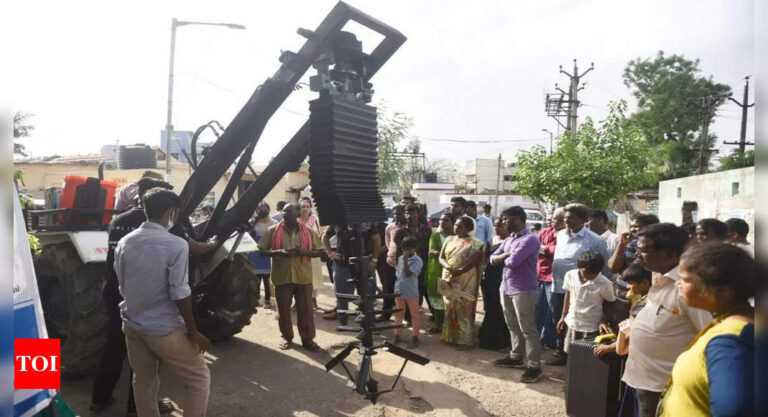
CHENNAI: On the eve of Christmas in 2011, 28-year-old M Moses entered a septic tank in Tiruvottiyur to clean it. He wanted to make a few hundred rupees to buy new clothes for his wife Ruth Mary and three children for Christmas. But he died of suffocation in the septic tank. Mary, who was devastated after her husband’s death, took a vow to never take up any sweeping, desilting or manual scavenging work ever in her life. She started a petty grocery store in her slum in Ambattur and has been running it.
On Friday, Mary, now 44, was given HomoSep, a robotic machine, to cut up and homogenise the hardened sludge at the bottom of septic tanks so that it can be mechanically sucked out. She owns the machine and will run a company called Ambatture Safai Karamachari Enterprises (TSKE) which will operate the machine.
This is the second such victim who has been given this machine free of cost. On May 1, Nagammma, widow of Kannan who died in 2017 while cleaning a septic tank in Tambaram, was given such a machine.
Solinas Integrity, an IIT Madras-incubated startup, developed this machine after interactions with SKA and septic tank cleaners. Prabhu Rajagopal of mechanical engineering department at IIT-Madras and Rema Mohan of NSE Foundation handed over the machine to Ruth Mary.
V Samuel from Safai Karamchari Andolan said this initiative began when IIT-Madras approached them seeking solutions for the manual scavenging deaths. “We are happy that such machines have been invented and we just hope governments and corporations start purchasing or renting them,” he said.
More such machines will be manufactured and those will also be given to families of the deceased manual scavengers who can make a living out of it.
Ambatture Safai Karamachari Enterprises will have members who are former septic tank cleaners and family members of people who died during manual scavenging.
“This enterprise will focus on changing lives of safai karmachari communities with dignified livelihoods providing mechanised sanitation solutions to stop manual scavenging deaths. This is the beginning of the change for safai karamcharis who have been facing generational caste discrimination, from using bare hands to owning robotic technology and machines,” Samuel said.
More than 53 people have died in Tamil Nadu while cleaning septic tanks in the past five years, including 13 in 2020.
A 2019 survey by Safai Karamchari Andolan, an organization under the ministry of social justice and empowerment, showed applications of 2,800 manual scavengers for IDs in eight TN cities were not accepted as they couldn’t provide proof of their work. The Tamil Nadu government stated that there were only 425 such workers.
On Friday, Mary, now 44, was given HomoSep, a robotic machine, to cut up and homogenise the hardened sludge at the bottom of septic tanks so that it can be mechanically sucked out. She owns the machine and will run a company called Ambatture Safai Karamachari Enterprises (TSKE) which will operate the machine.
This is the second such victim who has been given this machine free of cost. On May 1, Nagammma, widow of Kannan who died in 2017 while cleaning a septic tank in Tambaram, was given such a machine.
Solinas Integrity, an IIT Madras-incubated startup, developed this machine after interactions with SKA and septic tank cleaners. Prabhu Rajagopal of mechanical engineering department at IIT-Madras and Rema Mohan of NSE Foundation handed over the machine to Ruth Mary.
V Samuel from Safai Karamchari Andolan said this initiative began when IIT-Madras approached them seeking solutions for the manual scavenging deaths. “We are happy that such machines have been invented and we just hope governments and corporations start purchasing or renting them,” he said.
More such machines will be manufactured and those will also be given to families of the deceased manual scavengers who can make a living out of it.
Ambatture Safai Karamachari Enterprises will have members who are former septic tank cleaners and family members of people who died during manual scavenging.
“This enterprise will focus on changing lives of safai karmachari communities with dignified livelihoods providing mechanised sanitation solutions to stop manual scavenging deaths. This is the beginning of the change for safai karamcharis who have been facing generational caste discrimination, from using bare hands to owning robotic technology and machines,” Samuel said.
More than 53 people have died in Tamil Nadu while cleaning septic tanks in the past five years, including 13 in 2020.
A 2019 survey by Safai Karamchari Andolan, an organization under the ministry of social justice and empowerment, showed applications of 2,800 manual scavengers for IDs in eight TN cities were not accepted as they couldn’t provide proof of their work. The Tamil Nadu government stated that there were only 425 such workers.